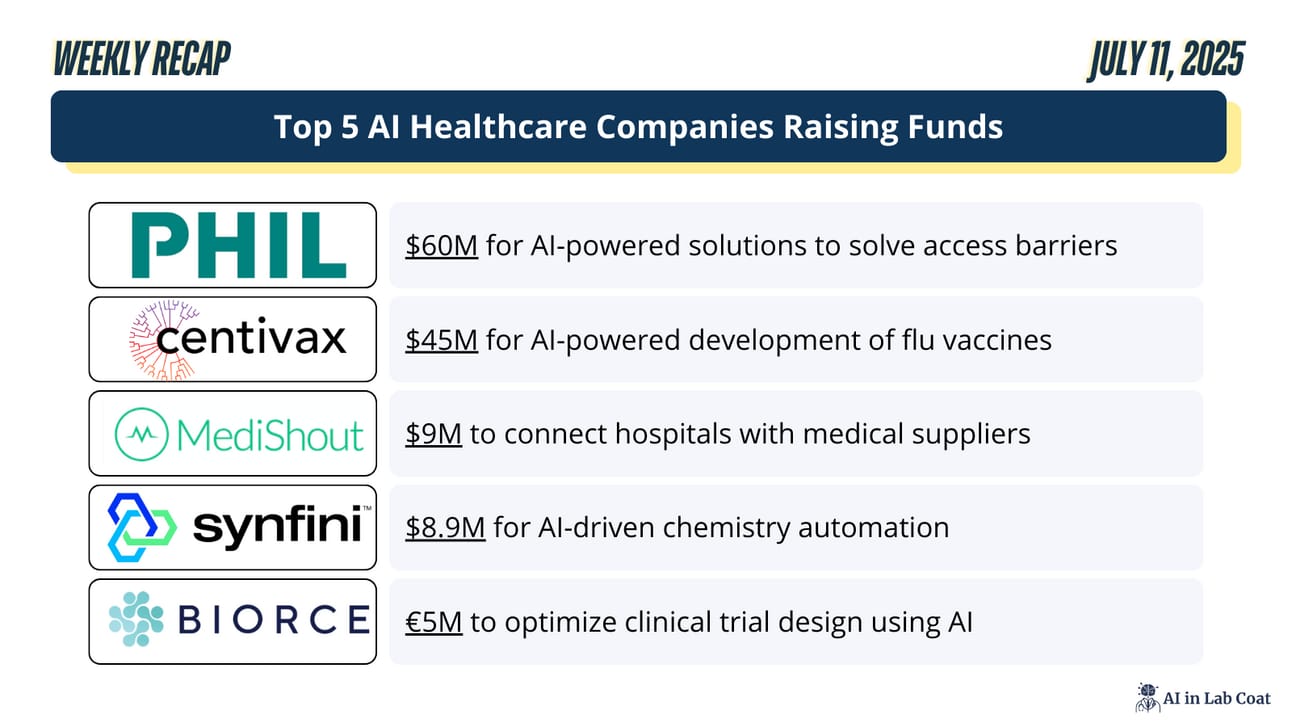- AI in Lab Coat
- Posts
- AI Uncovers Hidden Bias in Amputations
AI Uncovers Hidden Bias in Amputations
plus: AI Phishing Targets Hospitals

Happy Friday! It’s July 11th.
Google DeepMind says its AI-designed drugs are almost ready for human trials. After years of hype, the first real test is about to begin!
If these cancer drug programs deliver, we could be looking at the start of a new era for pharma. I’ve joked about this before, but Google is on its way to becoming the next major pharma company.
Our picks for the week:
Featured Research: AI Uncovers Hidden Bias in Amputations
Perspectives: AI Phishing Targets Hospitals
Product Pipeline: New AI Tool Spots Heart Protein Buildup
Policy & Ethics: Quebec Leads in AI Innovation
Read Time: 4.5 minutes
FEATURED RESEARCH
AI Finds Unexplained Disparities in Amputation Rates for Rural and Minority Patients

Implicit bias is often overlooked and is quietly influencing one of the most critical decisions in healthcare, whether to amputate a limb. More rural and minority patients are losing limbs, and now AI is helping to explain why.
12 million Americans have Peripheral Artery Disease (PAD), a chronic condition that restricts blood flow to the limbs.
Severe PAD can lead to Chronic Limb-Threatening Ischemia (CLTI) and amputation if not treated with surgery to restore circulation. But despite available limb-saving treatments, some patient groups still have higher amputation rates.
What the AI found: A new study from the University of Maryland, published in Epidemiology, used an AI model to analyze nearly 1.6 million hospitalizations from 2017 to 2019 across five states.
Researchers looked at over 70 variables, including clinical conditions, hospital capacity, patient insurance status, and neighborhood resources.
Even after controlling for all those factors, rural Black, Hispanic and Native American patients, and urban Black and Native American patients had higher rates of limb amputations:
Rural Black patients: 26% higher than expected.
Rural Hispanic patients: 50% higher.
Urban Black patients: 12% higher.
Why it matters: Lead author Paula Strassle says implicit bias likely drives these unexplained disparities in medical decisions.
The study shows we need clearer guidelines and training to address unconscious biases among clinicians so medical decisions are equitable and evidence-based.
For more details: Full Article
Brain Booster
What is the most common medical reason for limb amputation worldwide today? |
Select the right answer! (See explanation below)
Opinion and Perspectives
CYBER SECURITY
Hospitals Brace for Surge in AI-Powered Phishing Attacks
Hospitals are now the front line of a new cyber threat. Phishing attacks powered by AI are spreading fast with credential phishing in healthcare jumped more than 700% in late 2024!
With generative AI, attackers are now able to generate fake emails, login pages and texts in seconds. These scams mimic staff names, logos and language making them difficult to spot and easy to trust.
More Than Just IT: This isn’t just a technical challenge. One stolen login can expose patient records, shut down clinical operations or trigger ransomware. In healthcare, this type of privacy breach can put patient safety at risk, not to mention the confidentiality trust.
The Ethics of Defense: Hospitals are built on trust and access, but now every login is a risk.
Protecting data isn’t enough; leaders need to prioritize identity security from strong multifactor authentication to continuous monitoring of high risk accounts.
Tech tools can help but real change comes from ongoing staff training, clear policies and leadership that treats cybersecurity as part of patient safety.
The ethical bottom line: In an AI driven threat landscape, cutting corners or ignoring new risks will lead to an outcome where the system will fail to protect patients.
For more details: Full Article
Top Funded Startups
Product Pipeline
HEART HEALTH
FDA Approves Us2.ai’s AI Echocardiography Solution for Early Cardiac Amyloidosis Detection
Us2.ai’s AI Echo Copilot is now FDA cleared and CE marked to help clinicians detect cardiac amyloidosis, a life-threatening but often missed heart disease.
The software uses deep learning to spot subtle signs of amyloidosis in standard heart ultrasound scans, automating both pattern recognition and guideline-based reporting.
Validated in large, multi-center studies, the platform improves early detection, reduces unnecessary referrals, and streamlines workflow for hospitals and specialists.
Us2.ai’s solution can help catch amyloidosis sooner, leading to better outcomes for patients and more efficient care worldwide.
For more details: Full Article
Policy and Ethics
CANADA AI
Public-Private Investment Powers Canadian AI Growth Nationwide
Canada’s SCALE AI is investing nearly $100 million in 23 new AI projects, focusing on practical solutions.
By blending public and private funding, the initiative aims to de-risk innovation and boost AI adoption nationwide, especially in Quebec.
For healthcare and other sectors, this surge in homegrown AI could mean faster access to advanced tools, but also raises the bar for ethical deployment and oversight.
The move signals a maturing Canadian AI ecosystem, with real-world impact, but also new policy questions around equity, transparency, and safe integration.
For more details: Full Article
Byte-Sized Break
📢 Three Things AI Did This Week
After Elon Musk claimed Grok’s “woke filters” were removed, the X chatbot produced antisemitic and pro-Hitler content, prompting backlash as X scrambled to delete the posts, but not before tens of thousands viewed them. [Link]
Nvidia became the first public company to hit a $4 trillion valuation, driven by soaring demand for its AI chips, with its stock up tenfold since early 2023.. [Link]
The Velvet Sundown, a viral '60s-style band on Spotify, confirmed its music is made with AI, sparking debate about authorship and calls for labeling as it racked up over a million streams in weeks. [Link]
Have a Great Weekend!
 | ❤️ Help us create something you'll love—tell us what matters! 💬 We read all of your replies, comments, and questions. 👉 See you all next week! - Bauris |
Trivia Answer: B. Diabetes with poor circulation
Diabetes, especially when it leads to poor blood flow, now causes over half of all non-injury amputations worldwide. In many countries, 50–70% of lower-limb amputations happen because of diabetes complications, like infected foot ulcers that can’t heal. Preventing and controlling diabetes is one of the best ways to lower the risk!
How did we do this week? |




Reply